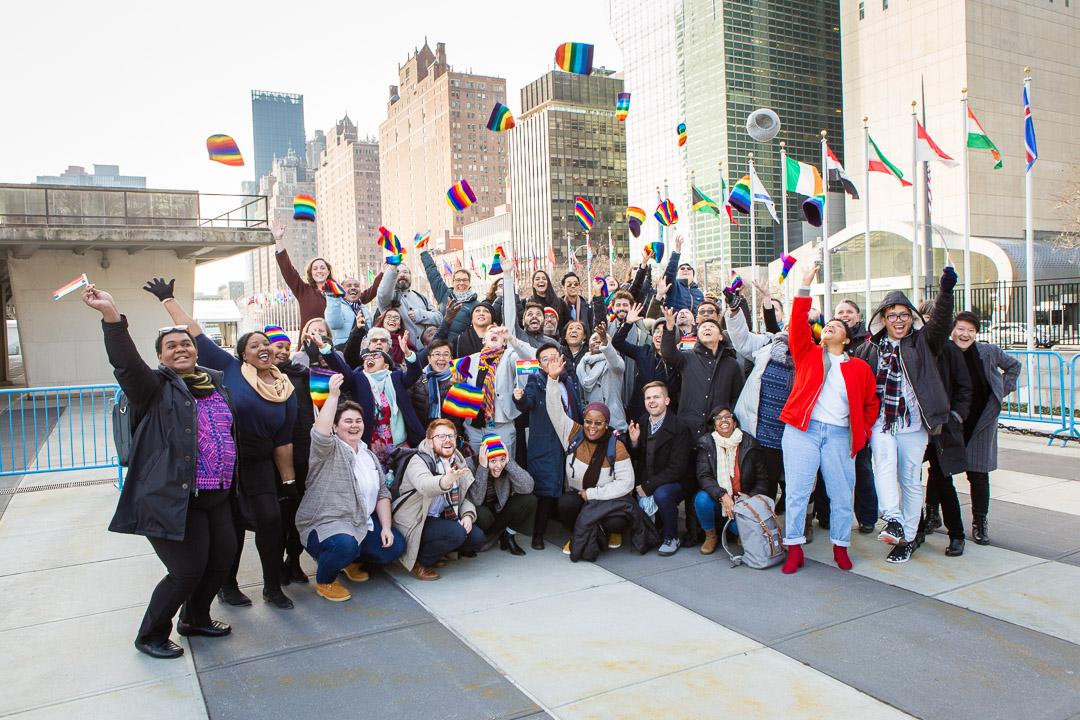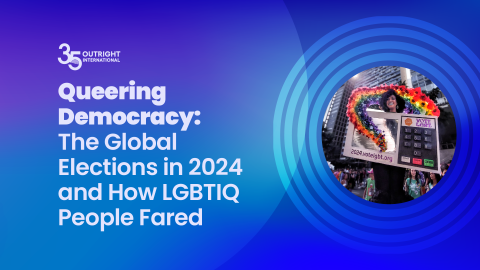
Report
Queering Democracy: The Global Elections in 2024 and How LGBTIQ People Fared
Region(s)
TOPIC(s)
Author(s)
Publish Date
September 10, 2025
Share
In a historic "super election year," democracy was on the ballot. For LGBTIQ people, so was survival.
In 2024, more than 1.5 billion votes were cast in at least 89 countries—nearly half the world's population participated in what became known as the "super election year." As democracies faced unprecedented challenges and authoritarian movements gained ground, LGBTIQ communities found themselves both under attack and at the forefront of defending democratic values.
Queering Democracy examines how LGBTIQ people navigated, participated in, and shaped electoral processes across 60 countries and the European Union during this historic year. From Brazil to Botswana, from the European Union to Indonesia, this comprehensive report reveals both the barriers faced and the victories achieved by sexual and gender minorities in their fight for political inclusion.
Key Findings: Hate as a Campaign Strategy vs. Queer Resilience
LGBTIQ People Made History Despite Barriers
Across the globe, queer candidates broke new ground in political representation. The report documents how LGBTIQ individuals and organizations worked tirelessly to raise political awareness, ensure electoral integrity, and secure their place in democratic processes—even when faced with criminalization, violence, and systemic discrimination.
Hate Became a Campaign Strategy in Elections
In at least 51 of the 61 jurisdictions studied, political candidates weaponized anti-LGBTIQ rhetoric for electoral gain. Politicians demonized "gender ideology," labeled LGBTIQ people as "foreign agents," and scapegoated sexual and gender minorities to deflect from policy failures. In some countries, elections devolved into what one observer called "a competition of who was the most homophobic."
Queer Communities Defended Democracy
When authoritarian movements threatened democratic institutions, LGBTIQ people showed up. From Bangladesh's July revolution to anti-authoritarian protests in Türkiye, queer communities mobilized not just for their own rights but in solidarity with all marginalized groups—understanding that their fates were intertwined with the health of democracy itself.
What's Inside the "Queering Democracy" Report?
Building on previous research by Outright International and complementing the GLIDE 2024 Landscape Analysis, this report offers:
- Global Overview: Trends and developments in LGBTIQ political participation, and the inclusion of LGBTIQ issues in political campaigning
- 11 In-Depth Case Studies: Detailed examinations of electoral dynamics in key countries
- 12 Country Snapshots: Focused analyses of specific electoral contexts
- 38 Compendium Entries: Comprehensive coverage of all 61 jurisdictions
Concrete Recommendations: Actionable steps for governments, electoral bodies, civil society organizations, and international institutions
Uncovering the Barriers to LGBTIQ Political Participation
As democratic backsliding accelerates globally, LGBTIQ communities often serve as canaries in the coal mine—among the first targets when democratic norms erode. Yet as this report demonstrates, they are also essential defenders of democratic values, working to ensure that democracy truly includes everyone.
The research reveals critical insights about:
- How discriminatory laws and the lack of legal gender recognition create barriers to voting
- The impact of family rejection and homelessness on political participation
- The role of gendered electoral practices in excluding trans and gender-diverse people
- Strategies that work to promote LGBTIQ political inclusion
Voices from the Ground: Activists’ Perspectives
Quote from Dumiso "Dumi" Gatsha
"There's nothing wrong with me wanting to participate in this democracy."
The report centers the experiences of LGBTIQ activists, candidates, and voters who are working to transform their democracies from within, despite facing discrimination, violence, and political weaponization of their identities.
Take Action: Demand a Democracy that Includes All of Us
Queering Democracy concludes with detailed recommendations for ensuring the full democratic inclusion of all people, regardless of sexual orientation, gender identity, gender expression, and sex characteristics. The report calls on governments to move beyond minimal compliance with international standards to actively promote and protect LGBTIQ political participation.
Access the complete analysis, including all case studies, data, and recommendations, to understand how LGBTIQ communities are reshaping democracy worldwide.
Frequently Asked Questions (FAQ)
What is the "Queering Democracy" report?
This report is a comprehensive global analysis of the political participation of lesbian, gay, bisexual, transgender, intersex, and queer (LGBTIQ) people during the 2024 "super election year." It investigates how LGBTIQ people in 61 jurisdictions (60 countries and the European Union) fared as voters, candidates, and campaigners in a climate of increasing democratic backsliding.
Why was 2024 a "super election year"?
In 2024, more than 1.5 billion people were eligible to vote in 89 countries, representing almost half of the world's population. Major elections were held in the world's five largest democracies: India, the European Union, the United States, Indonesia, and Brazil. This unprecedented global electoral cycle offered a unique opportunity to assess the state of LGBTIQ inclusion in democracies worldwide.
What were the main findings of the report?
The report identified three core trends:
- Politicians put hate on the ballot: In at least 51 of the 61 jurisdictions, candidates and political parties used anti-LGBTIQ rhetoric, hate speech, and disinformation as a campaign strategy. They demonized "gender ideology," scapegoated queer communities, and incited violence for political gain.
- LGBTIQ people faced significant barriers to voting: While no laws specifically banned LGBTIQ people from voting, numerous obstacles existed. These included a lack of legal gender recognition, discriminatory laws that criminalize same-sex acts, gendered electoral practices (like sex-segregated polling stations), and the risk of violence.
- Queer communities showed up to defend democracy: Despite the risks, LGBTIQ people actively participated in the elections. Queer candidates made history in several countries, and community organizations worked tirelessly to monitor elections, mobilize voters, and advocate for their rights. In countries like Bangladesh and Türkiye, queer people were on the front lines of broader pro-democracy movements.
How did you gather the information for this report?
Our methodology included a combination of:
- 64 semi-structured interviews with LGBTIQ activists, candidates, and voters in 23 countries.
- Targeted email questionnaires were sent to LGBTIQ organizations, with responses from 27 countries included in the final report.
- Extensive desk research, including analysis of news reports, campaign materials, election monitoring reports, and human rights documentation.
Did LGBTIQ people run for office in 2024?
Yes. The report found evidence of openly queer individuals running for office in 36 countries, including in record numbers in Mexico and Brazil. Historic first-time candidacies were recorded in Botswana, Namibia, and Romania. Transgender candidates also made history, including in Venezuela, El Salvador, and Sri Lanka, often in the face of intense transphobia and political repression. In the United States, Sarah McBride became the first openly transgender member of the House of Representatives.
What specific barriers did transgender and gender-diverse people face?
Trans, nonbinary, and gender-diverse voters faced unique and significant obstacles. The primary barrier was the lack of accessible legal gender recognition, which meant their official ID documents did not match their gender identity and expression. This led to issues at polling stations, including:
- Being forced to stand in lines that do not align with their gender.
- Facing harassment, intimidation, and unequal treatment from polling staff and other voters.
- Being disenfranchised due to restrictive voter ID laws.
What does the report recommend?
The report includes detailed recommendations for various stakeholders to advance the democratic inclusion of LGBTIQ people. Key recommendations include:
- For Governments and Legislators: Repeal discriminatory laws, establish accessible legal gender recognition processes based on self-determination, and explicitly prohibit political hate speech that incites violence against LGBTIQ people.
- For Electoral Management Bodies: Train polling staff on sexual and gender diversity, work with LGBTIQ groups to remedy discriminatory practices, and hold political parties accountable for hate speech.
- For Political Parties: Proactively engage with LGBTIQ groups, support queer candidates with funding and protection, and refrain from using anti-LGBTIQ rhetoric for political gain.
- For Civil Society and Donors: Collect more data on LGBTIQ electoral participation and address the critical funding gap for LGBTIQ organizations doing this work.
How can I use this report?
This report is designed to be a tool for change. Activists can use the data to advocate for policy reform. Journalists can use the findings to inform their reporting on elections and democracy. Policymakers can use the recommendations to create more inclusive electoral systems. By downloading and sharing this report, you can help amplify its message and contribute to the global fight for a democracy that truly includes everyone.

Explore News and Commentaries
We share news, cultural media and advocacy of partners, activists and experts through the lens of LGBTIQ people working on international human rights.
Read Our Insights